|

songs | interviews | photos | tours | boots | press releases | timeline
Performing Songwriter (US)
March/April 1994
The Inner World of Tori Amos
by Bill DeMain
Tori Amos takes her job seriously. She's explaining just what it means to be a singer-songwriter in the late 20th century.
"We are the poets who are going from town to town trying to remind the populace, with all the stuff that's going on, whether it's television, movies or what have you, all this media, that everything is straying away from the heart,"
she says.
"Everything is really straying away from what's inside of yourself. And that's what people are starving for."
For the past three years, Tori has been doing her part to supply some daily bread of emotional substance to the listening public. On her debut, 1991's 'Little Earthquakes', the fiery songstress confronted some difficult personal subjects: a woman's struggle for self-worth ('Silent All These Years' and 'Crucify'), buried anger ('Precious Things'), death ('Happy Phantom') and rape (the chilling, a-capella 'Me and A Gun').
The result of this self-therapy was a striking, unconventional record, teeming with gorgeous melodies and stirring arrangements. In the hands of a lesser artist, all this dealing with issues could easily have soured to a whining and venting session, but Tori tempered her approach with poetic lyrics, playfulness and a flamboyant, Lolita sexuality. This erotic persona is curried even further in her mesmerizing concerts. By her own admission, she
"makes love with the audience."
Whipping her bright red mane into a frenzy, undulating against the piano keys and singing in a voice that can rise from a velvet whisper to a tempest's raging howl, she often appears to be approaching orgasm on stage. Of her performing approach, Tori comments simply,
"I have a responsibility to give all of my being, which I make a commitment to."
For this 29-year-old artist, the commitment to music began early. The daughter of a Methodist preacher, Tori was pounding the keys when she was a mere two-and-a-half. By age five, she'd won a scholarship to Baltimore's Peabody Conservatory. Six years later, she was expelled. Her crime? Playing by ear and improvising. As a teenager, Tori gigged continuously, playing everything from Gershwin to U2 in hotel lounges and gay piano bars. All the while, she was honing her writing skills. Following her love of music, she eventually moved to LA and released 'Y Kant Tori Read' (out of print), a heavy metal album that unfortunately was more about image than content. It stiffed, leaving a confused Tori to wonder, where do I go from here?
Four years later, after intense self-examination and a move to England, she re-emerged with a newfound confidence and a whole bevy of strong songs. She was signed and her album 'Little Earthquakes' shook the British charts with a seismic jolt, bringing a flood of popular and critical acclaim. The musical conquest continued in America, where the record went gold and Tori's passionate performing style set the pop world buzzing. Her follow up record, due out in February, called 'Under The Pink', is a compelling collection of songs - or "girls" as Tori calls her creations - that are at once haunting, troubling, delicate, abrasive and beautiful. Though she's often compared to Kate Bush, Jane Siberry and Laura Nyro (good company, to my mind), Tori Amos is carving out her own unique spot on the musical map.
You've been writing songs for over twenty years. Has it gotten any easier?
Tori Amos: I think it's harder than it was in the first ten years that I was doing it, because there was no judgment then. Like with this new record, all the songs kind of showed up, all dressed up - and all the songs are girls, don't take this wrong, some of them are heavy male energy but they're all babes - and they all come in different shapes, sizes, colours the whole trip. Some of them aren't even human looking, but they're a form that feels kind of female. And they would come and say "it's time for you to put down in music my essence and what I'm trying to tell you." So I would feel the essence of a song and it would completely leave me then I'd have to start again. I don't know if you've ever had a dream where you've written a song and you really love. It's great, then you wake up and you can't remember it. This is kind of the same thing, except I'm awake. And now this whole record within this year. I was gonna take a year off, but the songs just demanded that I tell their story, and their story was about life under the pink. That's why the album is called 'Under the Pink'. These are just some of the different lives that happen in that world.
That expression 'Under the Pink' - What does it mean to you?
Tori Amos: Well, if you ripped everybody's skin off, we're all pink, the way I see it. And this is about what's going on inside of that. That's what I'm really interested in, not the outer world but the inner world. There are many other songs that live under the pink. These are just a few of them, these are just the girls who decided to come to the party.
To make that a successful party, do you have to keep a pretty disciplined schedule?
Tori Amos: Well, they haunt me, these songs. You see, I've been doing it since I was a little kid - almost before anything else. I can't even remember when I started writing, I was always making up my little ditties. So it's kind of a part of my day. As far as the discipline goes, I'm a pretty disciplined person anyway, and I'm pretty ruthless, as far as what stays and what goes in a song. I always listen to my tummy.
Can you explain that?
Tori Amos: Beyond the logical mind there is the tummy. And I really believe this, because we can overthink everything. Hey, I'm not writing things for some genius that's sitting trying to criticise. I'm writing from the tummy, because that goes beyond what somebody else's concept of cool is. I'm so sick of cool. If this world has one more megameter of cool, we're just gonna explode. So it's about allowing yourself the freedom to express. When you allow yourself the freedom, that's your first step. Then the other step is the craft of it, the skill. Okay, so if I don't have a very big music vocabulary, it's not about big. It's about how you use what you know. I think you can stay on one chord for five minutes and make it incredibly interesting, if you know what you're doing. The more that I open my mind to different possibilities musically and lyrically, then the more places I can go. Whereas if I'm going I-IV-V-I all the time, it's gonna get a little sweetie pie (laughs). So that's the other end of discipline. It's like running a marathon. You can't run it unless your muscles and heart can take the distance.
I remember reading how you prepared yourself for one writing session by sitting in the centre of a kind of circle of lyric fragments and song titles. Do you always do meditations like that to conjure up a song?
Tori Amos: Yes. For this album, I was in New Mexico for the writing and recording of it. And I would go out into the desert and just sit until really the soul of the song came and visited me. When it would come, I would just start to get to know who this being was and what they were trying to say to me. Of course all these beings are just parts of me, parts of you. Anybody that comes to visit you is a part of you somewhere, somehow. So I would sit and try to just feel what I was feeling. So many times, I think I'm supposed to feel a certain way, and that's not good. That's not very interesting, in your normal life or your creative life. So I would sit by the Rio Grande and try to stop all the voices. I still had to deal with it as much as last time. 'Silent All These Years' was just a beginning, but the outside voices didn't get any quieter, they just got louder.
The whole last record was about finding my voice again. So it was kind of different because I had just stumbled onto things that I hadn't dealt with in fifteen year, whereas this record it's about how to... struggle to stay awake, if you know what I mean. To stay conscious, to be present... because once you go, "yeah, this happened to me, yeah I was violently held hostage and sexually and emotionally violated; yeah I was a minister's daughter and I denied how I buried my true beliefs for all those years, yeah, yeah, yeah. When you first deal with those realisations, it's kind of like the whole earth opens up. A week later, a year later, you don't have the firecrackers like you did, but you're still healing and dealing with things. So this one was a bit trickier, because when you first come to a realization, it's like a kid in a candy shop. We've talked about these subjects before, so obviously I can't write 'Me and a Gun' again, because how can you write that again. This record is working through not being a victim anymore. I had to sit out there in the desert and listen to what my inner being was really saying, not what I wanted it to say to me.
Do your lyrics arrive in a stream of consciousness?
Tori Amos: Lines here and there do, but there's a lot of re-working that I do. I'm pretty ruthless with lyrics. I don't let anything slide. The music is more stream of consciousness and it's always done first, with a line here and a line there. Again, a line of lyric will come for a verse, then I have to craft around what does this line mean? What needs to support it? Okay, it's a very interesting line, but how I set it up or how I pay it off is where it really means something or doesn't mean diddly. Then it comes back to what I am trying to say here and it gets tricky because I'm not in that trance anymore. I'm just sitting, me and my chair, me at the piano, going "what is this girl trying to tell me?" even though this girl is me. So I'm sitting there by myself and I have to try to go into the inner world. It's all about the inner world, songwriting is. Even if you're talking about the outer world, you have to go into the inner world to see the outer world with any interesting viewpoint.
On the subject of your lyrics still, is it important for you to rhyme?
Tori Amos: I like assonance myself, close, but not a true rhyme.
The reason I ask is that your lyrics are kind of free verse, yet by not having perfect rhymes, I think they hit you harder in a way.
Tori Amos: Yes, I agree. I'm not a big believer in rhyme. Who decided that rhyming was the way to do it, who was that guy? Let's go find him and have a little chat because this has really cramped writers for a long, long time. Believe me, when I wrote, "We'll see how brave you are, we'll see how fast you'll be running, we'll see how brave you are, yes Anastasia," I didn't think of it as an assonance, though it is if you do it tonally. But it's about content, it's not about the rhyme. Everything is tone to me, like what a word feels like. There's certain words that I love, like "lemon pie." How it feels in my mouth.
What's the happiest accident that's ever turned into a song for you?
Tori Amos: I don't know if this is happy, but it's kind of worth mentioning. The song 'Pretty Good Year.' I got a letter from a guy named Greg. He's a fan, and this letter just happened to get to me, because a lot of times I don't get them. But he's from the north of England and he drew this picture, a self-portrait of himself. It was a pencil drawing and Greg had glasses and long hair and he was really, really skinny. He had this drooping flower in his hand. And he wrote me this letter that touched me to the core about how at 23, it was all over for him. In his mind, there was nothing. He had become and all his dreams, he just couldn't seem to catch the kite by the tail. You know, sometimes you see that kite flying and bloody hell, you just have to grab the tail, bring it down and see what's on that kite. Well, he just couldn't find a way around putting his desires and his visions into anything tangible, except this letter.
The whole concept of how many people today, before they even reach thirty - it's a functional exercise waking up, brushing your teeth, going through your day... people have just numbed themselves. I don't know the answer why. I think there are loads of answers. It's not my job to come up with an answer. Nobody wants to hear an answer from me. Nobody asked. The point is, what I tried to come up with is the feeling we all feel. Shaking us out of the numbness. I was just telling Greg's story and Greg affected this singer so much that it brought my own stuff into it, and that was kind of a neat surprise.
Once I read that you said that you tried to write like a camera. That's an intriguing notion. Can you elaborate?
Tori Amos: If I can't see and smell and taste what's happening, then I'm not doing my job. I can't write something where I'm not tasting what the wall is made out of. I wanna know if there's smokers in the room. I wanna know if this person washes or only kind of washes twice a week. It's okay, no judgment, I just have to know, because that's the thing that shakes me out of my sleepy pie, is the senses. When I'm listening to the songs, I have to feel like I'm living them with this girl that's singing. That's my director point of view. And yet being the writer of the play and also the actor, sometimes it gets a bit self-involved (laughs). Then some of the songs, like "God," I'm just so in the middle of, that I'm not really the director. When I wrote that I was having a complete conversation with the concept of what God is. Not necessarily what I think God truly is, but what the institution, whether it be educational or what have you, has made of God. To me, it's the root of all problems, that song right there. For me, one of the most important things I've ever done. You can call it my prayer if you want.
What are the top three things you wish you could do as a songwriter but haven't been able to?
Tori Amos: The biggest one is I don't think you can ever feel like you're finished as a writer. There's always so much else to say. There are pieces I've written that I'll never be able to write again, like 'Me and a Gun' or 'God'. Once you say it, you say it. But I think that as songwriters, we have to say, hey, we did that. When you're dealing with a rape subject, you got some pretty serious guns loaded there. It's a deep subject. It's very different than when you're dealing with a song like 'Cloud on my Tongue'. So I try and compare, I just wish I could stop comparing my different songs, because I'll never write 'Me and a Gun' again. I can't. I can write about the aftermath, and that's what I do. All my songs, whether it's 'Pretty Good Year' or 'Yes, Anastasia' are about the healing process. I don't think that I'll ever have written enough work to feel like I can die now. But I will die and it'll just have to be enough. I guess that's one, two and three all in one.
You've called your performance style "confrontational." Do you think it's necessary to be shocking in some way these days to get people to listen to you?
Tori Amos: I don't know. Shocking can be a bit boring. My performance style is more based on my relationship with the songs and what I need to express that night and the energy in the room. If I walk into a room, I can't tell you right now how I would handle it, until I'm in the situation, but I play the piano in a pretty passionate stance. My right leg supports my whole body. That's one big reason why it's swung back behind me. And the left foot on the pedal because it supports my diaphragm and my whole body and I can play with ten times the power while I'm singing than I could in any other way. The deal is that I have a responsibility to give all of my being, which I make a commitment to. I go into a meditation and a trance to expose myself.
And if you come there to just be a bit of a sneaky Pete, then you know, it's not only me up there. I call a lot of energy into the room. I'm not alone. There's like thousands of spirits hangin' out. So I'm usually pretty supported when I walk out there and the whole live performance is about transformation of myself. I go and find different parts of myself each night that I need to deal with. Sometimes it's joy. Sometimes it's my violent side or whatever, and we work through it. The audience dictates to me what I'm going to deal with, because I tune into them and everybody there that night is changing the atmosphere. But if there's some energy that's disrespectful, it's not just about paying a ticket price, I don't make money off the tour. It's not about that. It's about honouring each other and I honour my audience and they're pretty wonderful people. They're all interesting characters, they all bring stuff to the party.
How does a songwriter shed layers and expectations and find their own sound?
Tori Amos: First of all, songwriters need to understand what is their intention and what is our role. We are documenting a time. That's what we're doing. Music can do that in a way that nothing else can. We love painters and we love dancers, totally groovy. But sound goes into the being. I think it changes the DNA, I think it can shift somebody's whole molecular structure. I really believe that. When they hear something, the kind of emotion that it can stir up, the memory or what have you. So what is our job? Our job is to get in touch with ourselves. If we're not in touch with ourselves, how can we possibly give something to the people out there. My big worry is that we as songwriters aren't doing our job, because we're letting these people who run the industry, who run critic's sheets, that run the radio stations, that run whose song's getting no who's record, dictate what we're going to talk about. Now hang on a minute. If all of us got together and had a little pow-wow and said, you know, we have a commitment first to ourselves and out of that I'm sure each one of us can come up with something a bit catchy. But what are we talking about? There's no excuse for this schlocky shit out there, there's no excuse. Anybody that's writing shit, they know. I'm not talking about sentimental, but we all know when it just doesn't do what even it wants to do.
Hey, I can hear something - and it's not just me, c'mon loads of us can go, that person wrote something to please somebody. This is not about an inner experience or even somebody else's inner experience that they stole. This is about listening to another song on the radio that was a hit and formulating it. Formulated songs. Hey, if that works for you as a writer and you make lots of money, go knock yourself out. But what is our role? If we could remember who we are. We are the poets who are going from town to town, and trying to remind the populace, with all the stuff going on, information, whether it's television, movies or what have you, all this media, everything is straying away from the heart. Everything is really straying away from what's inside of yourself. And that's what people are starving for. I don't like the word documentation, but in a sense, songwriters are the mirrors, just like the poets were in another time. The poets of the late 19th century especially. The French poets, they were the voice of their time. So what are we? I think there's a lot of us who are trying to remember why we're doing what we're doing. We have to put our hands, as writers, on the 220-voltage and say, well, what do I want to write for?
As an artist you don't fit neatly into any kind of format. How did you get around that?
Tori Amos: I just kept honouring myself. I said, this is what I do, I'm a girl who plays the piano. This is what I do. So if nobody comes to see me, guess what, I'll be in my living room playing the piano. Now I hustled and I got my work out there and it's not like I didn't take it to the street, because I did. I played for as many people as I could and I keep honing my craft and I keep trying to just explore myself and explore my writing and share it. Sharing is why we do it. I don't think we're writers if we don't want to share. But if nobody wants to hear it, I'm still going to do it. I'll share it with myself. And then I go listen to other people and they share with me, and it makes me feel much better.
Any final words of advice?
Tori Amos: I do want to support the writers out there. Our job is a real special one, because we're either supporting a media that would like us to forget about our feelings or we go against the media and say, no, we want to remind people that they can form their own belief systems. It's about encouraging each individual to be your own bird. You got to be you own song. That's our job.
original article
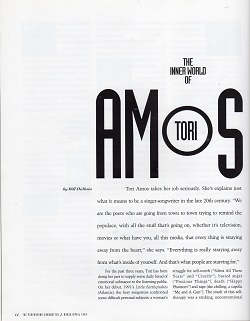 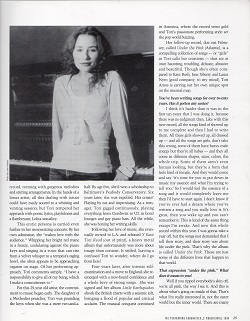
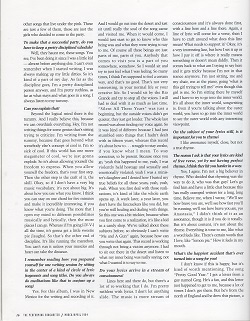 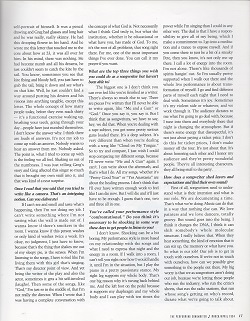
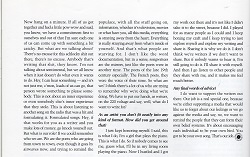
[scans by Sakre Heinze]
t o r i p h o r i a
tori amos digital archive
yessaid.com
|